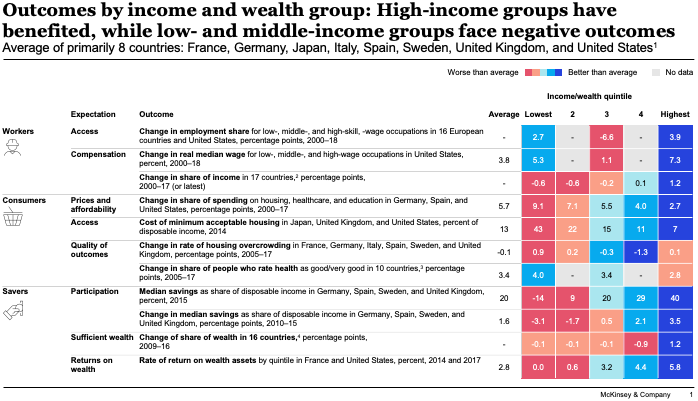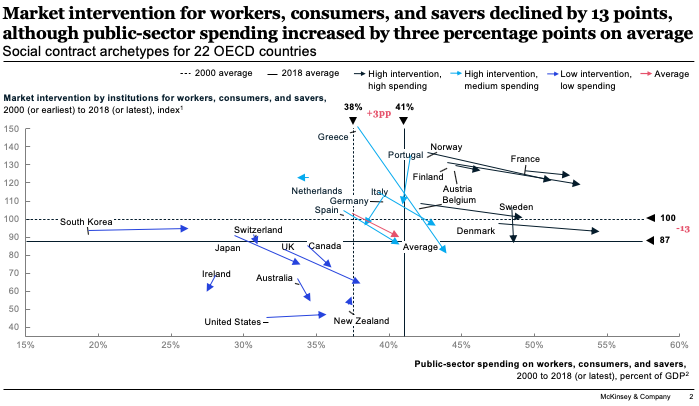Social contracts capture an implicit promise to share economic risks, via unemployment insurance, for example, or public health care services. They also stand in for expectations about a fair share of economic gains (e.g. via collective wage bargaining and public pensions) for households and their children (Krugman 1992). Because these contracts are historically rooted, they come in distinct national guises, from the individualistic American Dream to the Nordic volkshemmet. A broad body of literature has examined aspects of the social contract and its evolution. Hall and Soskice (2002) developed a firm-focused, binary taxonomy opposing liberal-market economies to coordinated economies. Amable (2003) allows for a finer-grained grouping of national systems of insurance against shocks, using additional dimensions (wage formation, innovation system, education).
Our latest research published in February examined the evolution of institutional mechanisms to buffer economic shocks since the beginning of the 21st century. This exercise documented substantial variety across the 22 advanced economies studied, but also revealed a strong underlying current: more and more risks have been de-socialised and shifted away from collective buffering mechanisms towards the level of individual households. Increasingly, individuals across OECD countries are responsible for their own economic outcomes. This trend has been concurrent with the deeper integration of markets and swift technological change, both of which have demanded even greater adjustment and in some countries have prompted a populist backlash.
The massive shock of the Covid-19 crisis, and the unprecedented responses from fiscal and monetary policy (Baldwin 2020), are now shining a harsh spotlight on the gradual de-mutualisation of risks that were once borne collectively (Hacker 2019). New policies introduced as a reaction to the current crisis as well as corporate involvement indicate that the pendulum may be swinging back, with institutions intervening to support individuals and help manage households’ economic risks.
Changing institutional environment
We focused on economic aspects of the social contract. Citizens have expectations about outcomes in three roles: first, as workers concerned about employment opportunities that will allow them to earn a decent and stable income; second, as consumers wanting access to high quality and affordable goods and services; and third, as savers aiming to build up wealth (mostly for retirement) by investing part of their income, thereby tapping into the returns generated by a growing economy.
We find that the first two decades of the 21st century brought about major changes in advanced economies across these three arenas. Many job opportunities were generated in this period while prices for discretionary consumer goods, such as clothing and communications, fell dramatically. However, working arrangements became more fragile, wages stagnated, and the labour share of income fell (Mischke et al. 2019). The costs of healthcare, education, and especially housing increased significantly faster than average inflation. This was particularly visible in economies that treat these as largely private goods. Hence, income gains, as far as they existed in the middle and lower class, were absorbed. This also spelled a rising risk of old-age poverty for millions of people in the 22 OECD countries.
Only 50 years ago, rather different social contracts prevailed across the countries in our sample, the upshot of a Great Transformation (Polanyi 1957) that embedded capitalism in a variety of institutional structures. From the beginning, this transformation was about managing risks arising from the adjustment costs that come with dynamic economies. Bismarck in the 1880s and Beveridge in the 1910s provided different approaches, and from them many variants derived, with social institutions providing a buffer that made change acceptable.
From the beginning, economists have stressed benefits as well as costs of these dynamics, suggesting ways to take care of those losing out economically.1 Rodrik (1997) showed that open, dynamic economies often have substantial insurance provided by the public sector or collective institutions, which does not seem detrimental to their economic performance. But since the 1970s, against the background of a mediocre productivity performance, debates about the crisis of the welfare state has led to policies of downsizing pursued across the political spectrum.
Outcome at aggregate and individual level
Judging by their average economic performance, the more privatised or individualised social contracts appear to have brought significant economic advances to workers, consumers, and savers in the first two decades of the 21st century. Up until the Covid-19 crisis, employment was at record levels, with 45 million more jobs in 2020 than two decades earlier, 31 million of them for women. Technological progress has also brought ample new opportunities, including lower prices for some goods and greater possibilities for working independently. Mean wealth was back up above its 2008 levels.
However, a closer look at outcomes for the almost one billion individuals in our sample produces a considerably more nuanced picture (see Exhibit 1). Spoils have been distributed unevenly. For about 275 million workers in our sample, jobs are increasingly polarised and wages have stagnated. Concurrently, the rising cost of basic necessities, such as housing, healthcare, and education, has eroded welfare and reduced opportunities for about 60% of households – rising housing costs alone have absorbed more than half of income gains for average households in the UK, US, and some other countries. In addition, public and employer defined-benefit pensions have been scaled back, leaving about the same 60% of the population vulnerable, unable to save enough to make up the difference.
Figure 1 Outcoumes by income and health group
Lower-income households have borne the brunt of these changes. Young people have too: they are having a harder time than their elders finding a secure first job – between 2000 and 2018, the employment rate of people under 30 actually declined, and those working are more likely to be on temporary contracts. Compared to their peers half a century ago, young people are building wealth at a much slower pace. In France, for example, a person in 1970 had accumulated 61% of average adult wealth by age 30; by 2010, the share of wealth had dropped to 32%.
Major challenge: make adjustment palatable
Before Covid-19 struck, these findings already added up to a roster of complicated challenges for policy makers, business leaders, and unions. To some extent, these challenges are the result of global forces, including technological advances, globalisation, and changing demographics, with a decline in the working-age population in a number of countries, including much of Europe and Japan. But our research also highlights the importance of institutions handling these challenges in a more palatable, mutually beneficial way. Across most of the 22 countries, our research found a common pattern of lower policy intervention across the labour, goods and services, and capital markets: workers had lower employment protection while savers faced the change from defined-benefit to defined-contribution pensions, making individuals more responsible for their retirement savings. Government spending has been higher, but this is largely related to higher aging-related costs in healthcare and pensions than to compensation for the increasing market risks to which individuals are exposed. This pattern of the de-mutualisation of the social contract is the same regardless of the often quite different starting points (or varieties of capitalism).
In good times, with widely shared benefits from change – i.e. economic growth translating into broadly based increases of income – a significant part of the population should be able to manage the inherent and inevitable risks of dynamic economies. However, this is clearly not the case when massive economic shocks occur, as in the current situation. Instead, where social buffers have thinned, the individualisation of the management of risk is prone to amplify the downturn. Liquidity constrained households have to cut back on demand. Automatic stabilisers of a substantially reduced size are less capable of mitigating downside risks to workers, consumers, and savers.
Figure 2 Social contract archetypes
While policymakers’ and business leaders’ primary concern is slowing the spread of the coronavirus and ensuring the availability of medical services, they are concurrently charged with responding to the unprecedented economic fall-out. How should business leaders and policymakers react? Of primary concern is supporting households in their command over basic necessities:
- The accessibility and affordability of basic services (in the current situation, particularly health care) is a starting point. Increasing public expenditures to expand hospital capacity or finance testing or treatment of uninsured individuals should be the highest priority. Companies that ban price arbitrage of healthcare goods and invest in R&D in the medical space are making an important contribution, too.
- Housing, the largest item on households’ monthly bill, is also a concern. While those who lose jobs or face significantly declining incomes can reduce discretionary consumption, rent or mortgage payments are fixed costs with the looming threat of foreclosures or eviction. Moreover, not being able to pay interest or rents comes with serious effects on the stability of the banking sector. A solution needs to be found that balances the management of risks to financial stability with cost allocation between taxpayers and real estate owners.
- Supporting individuals in their roles as workers is another pressing concern. In addition to automatic stabilisers, fiscal policy is currently deployed on double the scale than after the 2008 financial crisis. Monetary policy has also been dramatically relaxed, in the US as well as in Europe. Huge safety nets for companies have been established, though unevenly across many countries. A particularly effective device to cushion the hit to employment seems to be the German short time working scheme, funded by payroll taxes. The EU Commission is launching a similar program, called SURE, with a European dimension. But this leaves unsheltered the growing group of vulnerable independent workers and the self-employed. Importantly, some of the sectors most affected by the current crisis, such as food services, tourism, and transport services, feature the highest share of independent contractors. Policy innovations, such as compensation plans for gig-workers, are required to help this group of workers avoid further declines in consumption.
- Individuals are also affected in their roles as savers. Funded pension schemes have been hit hard by falling equity values and the perceived risk of increasing corporate defaults leading to a drastic devaluation of lower-rated corporate bonds. Today in the UK, ten times more people (a total of 9.9 million) rely on private schemes than in 2008. About 700,000 workers retiring this year in the UK could also be affected when selling their equity positions.
The pandemic and its severe economic consequences are thus revealing considerable vulnerabilities in the social contract as it has evolved over the recent past. The starkly increased economic exposure of many households is behind the enormous ad hoc support programs being structured in record time and at record levels. The question remains: once the immediate crisis is over, will the development of the economic aspects of the social contract continue on the path of the past two decades, with the shifting of responsibility for economic outcomes over to individuals, or will risk sharing be rebalanced towards an increasing role for institutions and mutualisation? The experience of the 2008 financial crisis and the tightening of financial sector regulations that followed might indicate that we are set for another historic turning point.
References
Amable, B (2003), The Diversity of Modern Capitalism, Oxford: OUP
Atkinson, A B (1991), “Social Insurance”, Geneva Papers on Risk 16(2): 113-131.
Autor, D (2019), “Work of the past, work of the future”, AEA Papers and Proceedings, 109: 1–32.
Blanchflower, D (2020), Not Working. Where Have all the Good Jobs Gone?, PUP: Princeton, NJ.
Barr, N (2018), “Shifting Tides, Dramatic social changes mean the welfare state is more necessary than ever”, Finance & Development, IMF, Washington DC: 16-19.
Baldwin, R (2020), “Keeping the lights on: Economic medicine for a medical shock”, VoxEU.org, 13 March.
Baumol, W (2012), The Cost Disease. Why Computers get Cheaper and Health Care Doesn’t, Yale: YUP.
Friedman, B (2005),The Moral Consequences of Growth, NY: AA Knopf.
Hacker, J (2019), The Great Risk Shift, The New Economic Insecurity and the Decline of the American Dream, Oxford: OUP (2nd ed.)
Hall, P and D Soskice (2001), “An introduction to varieties of capitalism”, Varieties of Capitalism: The Institutional Foundations of Comparative Advantage, UK: Oxford University Press.
Hicks, J (1932), Theory of Wages, London: Macmillan.
Katz, L F and A B Krueger (2019), “The rise and nature of alternative work arrangements in the United States, 1995–2015”, ILR Review, 72(2).
Krugman, P (1994), The Age of Diminished Expectations: US Economic Policy in the 1990s, Cambridge, MA: MIT Press.
Manyika, J, A Madgavkar, T Tacke, S Smit, J Woetzel and A Abdulaal (2020), “The social contract in the 21st century”, MGI Report, February.
Mischke, J, H Kotz, and J Bughin (2019), "The declining labour share of income: Accounting for the main factors from a meso perspective", VoxEU.org, 26 July.
Polanyi, K (1957 [1944]), The Great Transformation: The Political and Economic Origins of Our Time, Boston MA: Beacon Press.
Rodrik, D (1997), Has Globalization gone too far?, Institute for International Economics: Washington DC.
Rodrik, D (2018), Straight Talk on Trade. Ideas for a Sane World, PUP: Princeton.
Samuelson, P (1948), “International Trade and the Equalization of Factor Prices”, Economic Journal, 58: 163-184.
Vandenbroucke, F, L Andor, R Beetsma, B Burgoon, G Fischer, T Kuhn, C Luigjes, F Nicoli (2020), “The European Commission’s SURE initiative and euro area unemployment re-insurance”, VoxEU.org, 6 April.
Van Reenen, J (2011), “Wage inequality, technology and trade: 21st century evidence”, Labour Economics 18: 730–741.
Woetzel, J, D Pinner, H Samandari, H Engel, M Krishnan, B Boland and C Powis (2020), “Climate risk and response: Physical hazards and socioeconomic impacts”, MGI Report, January 2020.
Endnote
1 See for example Samuelson (1948) on the distributional consequences of trade and Hicks (1932) on the implications of technological change for wages.








